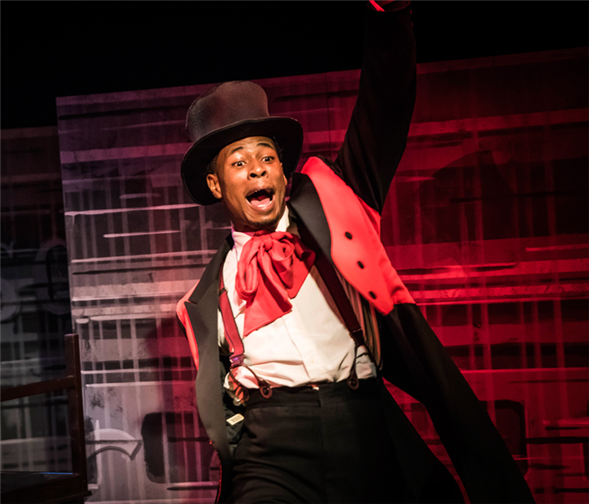Translate Page

A playwright confronts how the race of the people around us changes how we behave
---
There is only one person onstage throughout Howard L. Craft's Freight: The Five Incarnations of Abel Green. But if you look and listen closely, you might perceive quite a few more.
Centered on an African-American man who exists in five different versions, or incarnations, at various points in 20th century history and beyond, the solo play uses a science fiction-inspired framework to explore issues of identity that resonate painfully today. In presenting the internal struggles of these overlapping characters -- a minstrel in the early 1900s, the leader of a religious cult in the mid '30s, an FBI informant infiltrating the Black Panther movement in the 60s, a struggling actor in AIDS-era New York, and a mortgage broker in 2010 -- Craft lays bare the many guises minorities must wear to assimilate.
"I hadn't seen a lot of pieces that deal with the internal struggle of the black minstrel onstage, he says, and he adds that he was inspired by what African-American poet Paul Laurence Dunbar would call "'wearing the mask,' what wearing the mask does to you over a period of time. Even when you wear the mask so much you can't distinguish the mask from who you are."
Or as Abel Green announces early in the show, "All Negroes are actors by necessity. The script is passed down generation to generation. The Negroes who know they lines tend to live longer than the Negroes that don't, generally speaking as it pertains to dealing with white folks. As for dealing with other Negroes, well, memorization won't help. Negroes be changing on the daily."
The play, which runs at HERE Arts Center through August 9, was initially titled The Minstrel, the result of a playwriting class that had Craft create a 10-minute script based on an artwork of his choosing in the University of North Carolina Chapel Hill's museum. He gravitated towards Rose Piper's striking 1946 painting Slow Down Freight Train and started asking questions. "What does it mean to be black in America for a particular class of black folk? Or for black males during this period of history?"
Craft also recalled the famous words of W. E. B. Du Bois: "To survive in America, every black person has a double consciousness." The way a black man interacts with other black men differs greatly from the way he interacts with the dominant culture, Craft says. "We have to be able to operate in both worlds. That's not unique to black males; that's really any minority group."
At the behest of actor (and fellow North Carolinian) J. Alphonse Nicholson, who performed The Minstrel for his managers in New York, Craft expanded the piece into the current, 90-minute show. (Nicholson also stars in the production at HERE.) As he wrote, Craft sought to apply the concept of fraught duality not only to minstrel performers, but also to black men in different historical periods. Structurally, he borrowed from John A. Williams' story Captain Blackman, in which a soldier envisions himself fighting in every war from the American Revolution up to Vietnam.
Abel Green's trans-dimensional journey takes several turns, but ultimately prompts audiences to discern the kinds of identity crises that resonate regardless of time and space. After all, who among us hasn't used a mask as a shield to appease others?
In the final incarnation, for example, Abel is a former mortgage broker who has inhabited several personae. To his minority clients he was a charming salesman, to his co-workers he was a cold-blooded businessman, and now, before the audience, he is a penitent homeless man stripped of all pretense.
Although Craft is drawing from and concerned with specifically black male experiences, his final invocation of the 2008 American housing crisis demonstrates how performativity -- donning different masks for different groups of people -- can lead to a collective disenfranchisement.
"We're all just human beings experiencing these different circumstances," Craft says. "All art can be universal depending on what you bring to it and how you look at it." After all, he continues, "I write what I know and I ask questions I'm trying to figure out for myself, and oftentimes what I find is, other people are asking those same questions!"
---
Jack Smart is a Brooklyn-based writer and pop culture nerd. He is the assistant editor at Backstage, where he covers theatre, film, and TV.
Photos of J. Alphonse Nicholson in "Freight" by Dennis Cahlo